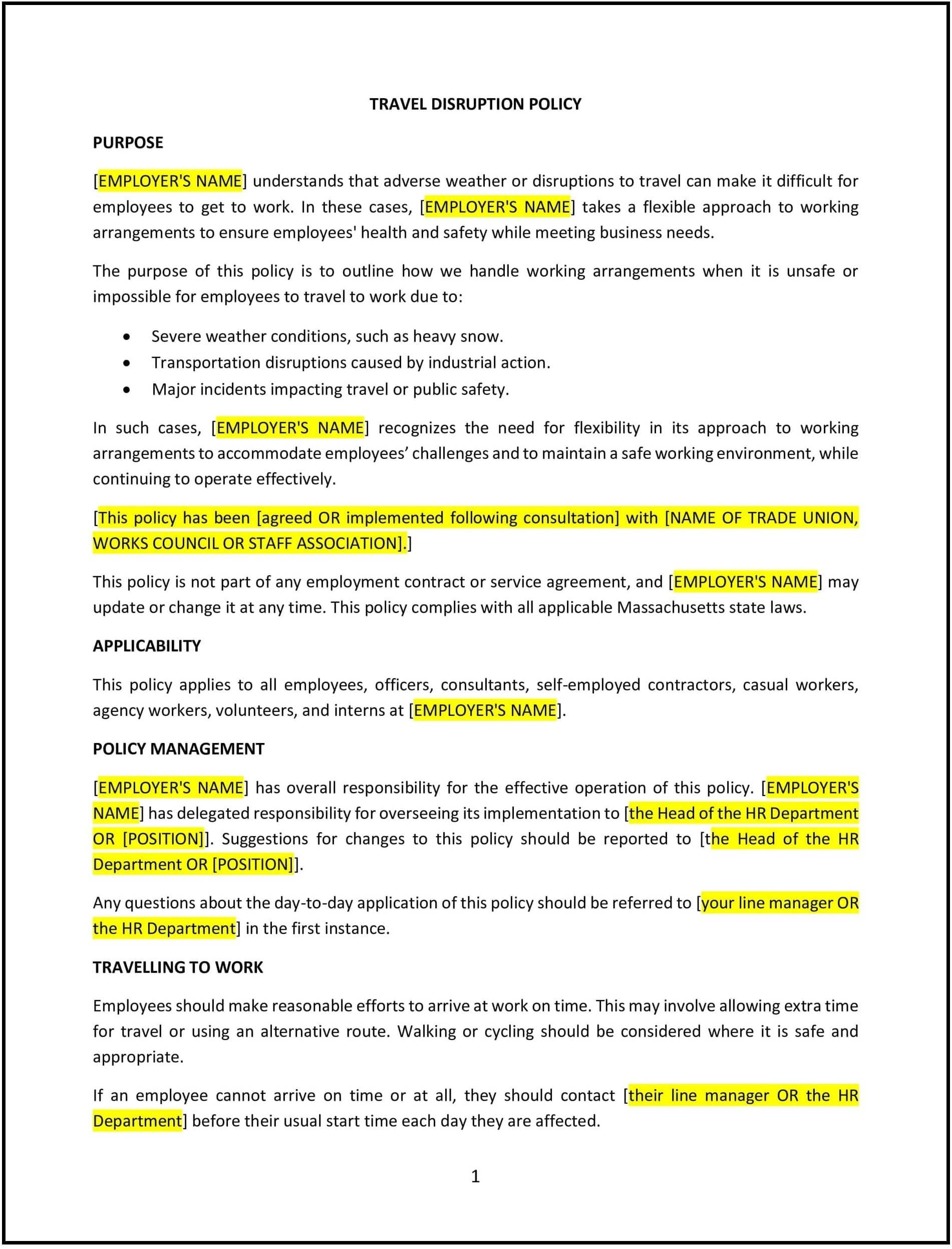Travel disruption policy (Massachusetts): Free template
Got contracts to review? While you're here for policies, let Cobrief make contract review effortless—start your free review now.

Customize this template for free
This travel disruption policy is designed to help Massachusetts businesses manage unexpected travel disruptions, such as delays, cancellations, or emergencies that affect employees traveling for work. The policy outlines how employees should respond to disruptions, the support the company will provide, and the steps businesses will take to minimize the impact of these disruptions on work operations. The policy helps businesses ensure that employees are informed, supported, and able to adapt to changes in their travel plans.
By adopting this policy, businesses can effectively manage travel-related challenges, reduce confusion, and ensure employees are able to fulfill their work responsibilities despite disruptions.
How to use this travel disruption policy (Massachusetts)
- Define what constitutes a travel disruption: Specify the types of disruptions that are covered under the policy, such as flight cancellations, severe weather, transportation strikes, or other unforeseen events that prevent employees from completing their travel as planned.
- Outline the responsibilities of employees: Employees should be informed of their responsibilities when a disruption occurs. This may include notifying their manager or HR as soon as possible, working with airlines or other service providers to reschedule travel, and keeping receipts for additional expenses incurred due to the disruption.
- Provide guidance on how to handle transportation issues: The policy should provide employees with guidance on how to manage transportation-related disruptions, including when to arrange alternate travel, how to rebook flights or other transportation, and the process for seeking reimbursement for unexpected costs.
- Address lodging and meal expenses: Employees should be informed about the process for seeking reimbursement for lodging or meals if a disruption forces them to stay overnight or extend their trip. The policy should specify how employees should handle these expenses and what is eligible for reimbursement.
- Clarify communication expectations: Ensure that employees know how to stay in touch with their team or manager in the event of a disruption. The policy should specify how frequently employees should provide updates and what information is necessary to keep the company informed of any changes to travel plans.
- Ensure compliance with Massachusetts and federal laws: Ensure that the policy complies with Massachusetts state laws and federal regulations regarding employee rights, travel, and expenses. This may include considerations for paid leave or reimbursement for time lost due to travel disruptions.
- Review and update regularly: Periodically review and update the policy to ensure it is compliant with any changes in Massachusetts state laws, federal regulations, or company practices regarding travel and expenses.
Benefits of using this travel disruption policy (Massachusetts)
This policy offers several benefits for Massachusetts businesses:
- Reduces confusion: By providing clear guidelines for handling travel disruptions, businesses can ensure employees know exactly what to do when their travel plans are affected, reducing confusion and stress.
- Supports employee well-being: Offering guidance and reimbursement options for expenses incurred due to travel disruptions demonstrates the company’s commitment to supporting employees during stressful situations.
- Maintains business continuity: The policy helps minimize the impact of travel disruptions on business operations by ensuring that employees can still fulfill their work responsibilities or make adjustments as needed.
- Ensures fair treatment: By clearly outlining the company’s stance on reimbursements and support during travel disruptions, businesses can ensure that all employees are treated fairly and equally in these situations.
- Promotes cost control: By providing employees with clear instructions for managing expenses, businesses can help ensure that costs associated with travel disruptions are managed effectively and appropriately.
- Enhances employee satisfaction: Employees who are supported during travel disruptions are more likely to feel valued by the company, leading to improved job satisfaction and retention.
Tips for using this travel disruption policy (Massachusetts)
- Communicate the policy clearly: Ensure that all employees are aware of the travel disruption policy and understand how to handle disruptions during business travel. Provide the policy in the employee handbook and review it during onboarding or team meetings.
- Train employees on how to handle disruptions: Provide training or guidance on what employees should do if their travel plans are disrupted. This may include practical tips for rebooking travel, managing expenses, and staying in touch with the company.
- Establish an emergency contact process: Ensure that employees know who to contact in case of a travel disruption. Whether it’s HR, their manager, or a travel coordinator, the policy should specify who employees should reach out to for support.
- Encourage employees to keep receipts: To ensure that reimbursements for disrupted travel are processed smoothly, encourage employees to keep all receipts and documentation related to any extra expenses incurred due to the disruption.
- Set up a reimbursement process: Make the reimbursement process for travel disruptions clear and efficient, so employees know exactly how to submit their expenses for lodging, meals, and transportation, and what documentation is required.
- Review and update regularly: Periodically review the policy to ensure it remains compliant with Massachusetts state laws, federal regulations, and any changes in the company’s approach to managing travel disruptions.